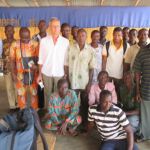Sixty agricultural enterprises have been financed through micro-credits, over 6,500 farmers and members of agricultural co-operatives have benefited from it and nearly 500 agricultural experts have been trained to improve their skills in the food chain. These are the results of the first phase of the project “Systems and financial instruments for agriculture in Togo” that Coopermondo, along with a pool of six Co-operative Banks (BCC del Garda, Bank CRAS – Sovicille, Banca del Veneziano, BCC di Roma, Banca Rurale di Treviglio, Emilbanca), is carrying out in the West African country.
“Coopermondo and BCCs’ contribution to the growth of the agricultural co-operative system in Togo is essential in order to improve living conditions as well as to promote food security and sovereignty in Togo”. This are the words used by Marc Akakpo, agriculture and co-op sector specialist from the Ministry of Agriculture of Togo, when asked about the work Coopermondo and the co-ops banks have been doing so far in the country.
The project is designed with a special focus on three different sectors: the agricultural one, the financial one and the socio-cultural one. As far as the agricultural sector concerns, Coopermondo offered political and financial support as well as technical training to the National Confederation of Peasant Organization (CTOP) representing 17 agricultural sectors and made up of around 500.000 members, 30% of which are women. During the first three years of the project, Italian agricultural experts, technicians of the Ministry of Agriculture and of the CTOP have trained around 451 local authorities, including 164 women, and 25 managers of the CROPPA, the recently born regional institutional representing the CTOP in the five regions of the country.
The financial sector, managed by the pool of the six BCCs for Togo, has provided, during the first three years of the project, a total amount of EUR 1,850,000 at a very convenient interest rate. The credit is supplied to the two micro-finance institutions (IMFs) partners of the project (FECECAV and URCLEC) which, in turn, facilitate access to credit to co-operatives, small and medium enterprises, producer organizations, processors, traders or actors in the agricultural sectors, with particular attention to women and youth.
So far 62 businesses have been financed, of which 25 farms, 15 entrprises specialized in breeding, 1 in bee-keeping, 14 in the processing of agricultural products and 5 in the marketing and transportation. Of these companies, 90% adhere to CTOP, since the setting of the regional CROPPA facilitated the process. For this reason, the technical support of the CROPPAs and the ability to accompany producers in the presentation and monitoring of bankable and sustainable projects is one of the challenges for the coming years. The direct and indirect beneficiaries of this contribution are over 6.500, among workers and members of farmers’ organizations.
Among the achievements in the socio-cultural sector, it is worth highlighting the creation of synergic and operational cohesion between the three partners in the project (the two micro-finance institutions and the Confederation of Farmers’ Organizations). A concrete result is the signing of a co-operation agreement between the local partners and the organization of a workshop in Lomé – which was attended by local partners of the project, representatives of the Ministry of Agriculture and Finance of Togo, agencies UN in the country (among others UNICEF, IFAD and UNDP), some NGOs in Togo and the beneficiaries of the loans – which helped to sensitize the audience on the dynamics and objectives of the project.
The project, which is about to enter the second phase of implementation, aims to give support to the national confederation of peasant organizations, especially through the regional offices, by creating new partnerships with international organizations and local universities to support research on new farming techniques and to improve working conditions in agriculture.
At the following link you can download the full report of the last mission (in Italian).



